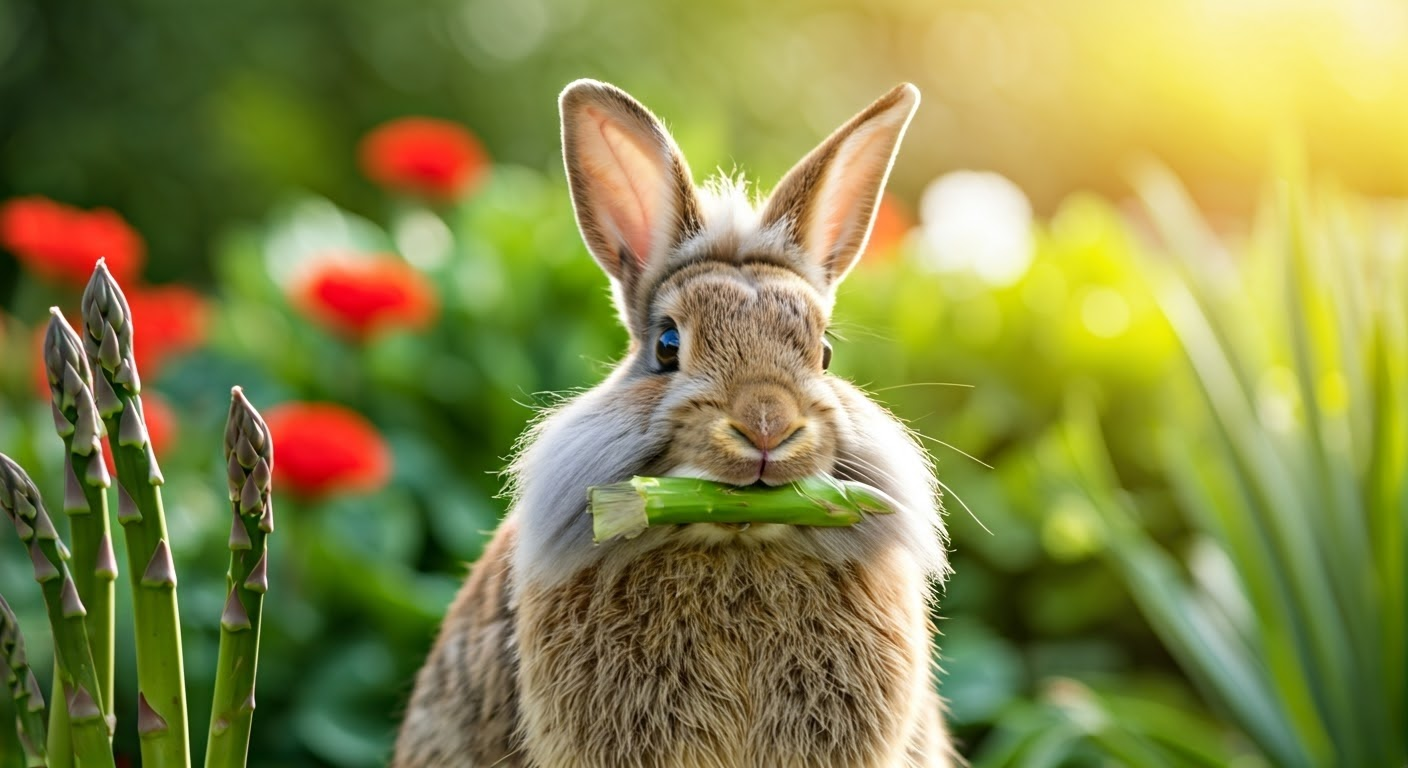Key Highlights
- Rabbits can eat asparagus safely, but only as a treat and in moderation.
- Asparagus has some vitamins and minerals, but it should not be a big part of a rabbit’s diet.
- Introduce new foods slowly. This helps you watch for any digestive upset.
- Make sure to wash asparagus well and give it to rabbits raw. Cooked vegetables are hard for them to digest.
- Focus on hay as the main part of your rabbit’s diet. It is important for their digestive health and dental wear.
Making a balanced diet for your rabbit is important for their health. They mainly eat hay and fresh vegetables. You might wonder how asparagus fits into their diet. Let’s look into rabbit nutrition and find out more.
Understanding a Rabbit’s Diet: The Basics
Rabbits are herbivores. This means they eat plants. Their stomachs are made to digest these foods. Hay should be the biggest part of their diet. It should make up about 80-85% of what they eat. Hay has a lot of fiber. This fiber is very important for a healthy gut. It helps prevent problems like gut stasis, which can be serious.
Fresh vegetables are also very important for rabbits, along with hay. They give many vitamins and minerals that help keep rabbits healthy. However, not all vegetables are safe for them. When you give rabbits new foods, do it carefully and in moderation.
The Importance of Vegetables in a Rabbit’s Diet
Leafy greens are great for rabbits. They provide essential nutrients. You should add a variety of vegetables to their diet. Romaine lettuce, cilantro, and bell peppers are good options. This way, your furry friend gets enough vitamins and minerals. However, be cautious with some vegetables. They can upset your rabbit’s digestion if you give too many.
When you add new vegetables, do it slowly, one at a time. This way, you can see if there are any bad reactions. If your rabbit has diarrhea or soft stool, it may be sensitive to the new food. If this happens, stop giving that food immediately. A rabbit’s digestive system is weak. Even healthy vegetables can cause problems if they are not introduced properly.
It’s important to watch how you add vegetables to your rabbit’s diet. Always provide fresh water along with hay and vegetables. This helps your rabbit control what they eat based on their needs.
Common Misconceptions About Rabbit Food
One common mistake is thinking that pellets should be the main part of a rabbit’s diet. While pellets can help provide vitamins and minerals, they lack the fiber found in hay. Giving too many pellets can lead to obesity, dental problems, and other health issues for bunnies.
Another mistake is believing that all vegetables are safe for rabbits. For instance, some people think cabbage is a good choice. However, cabbage and other similar veggies like broccoli and cauliflower can cause gas and bloating in rabbits. It’s better to give these foods in small amounts or to avoid them altogether.
Always talk to a veterinarian or a reliable source about which foods are safe and which are not for bunnies. Knowing this information helps you take better care of your furry friend.
The Nutritional Value of Asparagus for Rabbits

Asparagus can be a good choice to feed your rabbit from time to time. It has small amounts of important nutrients. These include vitamin E, vitamin K, and calcium. These nutrients help keep your bunny healthy. However, remember that the best way for your rabbit to get these nutrients is from their main food. This food includes hay and other leafy greens.
Remember, asparagus is safe for your rabbit, but it should only be a treat. You should not give it all the time. Giving too much can mess with their nutrition needs.
Key Vitamins and Minerals in Asparagus
Here’s a closer look at the nutrition of asparagus. Keep in mind that these values are for human eating and might change a little for rabbits.
|
Nutrient |
Amount per 100g |
|
Calories |
20 |
|
Carbohydrates |
3.88 g |
|
Fiber |
2 g |
|
Potassium |
202 mg |
|
Vitamin C |
5.6 mg |
|
Vitamin E |
1.3 mg |
|
Vitamin K |
41.6 mcg |
Asparagus has low calories and very little fat. This makes it a good snack choice for rabbits. The fiber content is not as high as hay, but it still helps with their digestive health.
Always start giving asparagus to your rabbit slowly. Watch how your rabbit responds. The potassium in asparagus usually isn’t a problem. However, too much of any nutrient can upset their sensitive systems.
Comparing Asparagus to Other Rabbit-Friendly Vegetables
Asparagus can be a healthy choice for rabbits. However, other vegetables are usually more nutritious and easier for them to eat in bigger portions. Here are some good options:
- Cilantro: It is packed with vitamins A, C, and K. Cilantro also has antioxidants. These help keep your rabbit’s immune system strong.
- Bell Peppers (red, yellow, orange): These peppers are rich in vitamin C. You can give them in small pieces several times a week.
- Romaine Lettuce: This lettuce has plenty of fiber and water. It is low in calories, so you can serve it more often than asparagus.
It’s important to give your bunny a variety of vegetables. This helps keep their diet balanced and interesting.
Just like asparagus, add these vegetables to your rabbit’s diet slowly. Give them in moderation, and always provide plenty of fresh hay. Keep an eye on what your rabbit likes and how it reacts. This will help you create a varied diet that keeps them healthy and happy.
How to Safely Introduce Asparagus to Your Rabbit

When you give your rabbit new food, do it slowly and carefully. Rabbits can feel changes in their diet. Start by giving your rabbit a small portion of asparagus, like just one thin tip. Keep an eye on your rabbit for any signs of digestive issues in the next 24 hours.
If your rabbit enjoys asparagus, you can slowly give them a bit more as time goes on. However, remember that, even if your rabbit likes it, asparagus should only be a treat. It should not be part of their everyday meals.
Preparing Asparagus for Your Rabbit
Fresh vegetables are crucial for your rabbit’s diet. Asparagus is a wonderful option. Pick firm, bright green stalks that have closed tips. When you get asparagus at the grocery store, go for organic ones. This will help lower pesticide exposure.
Before you feed your rabbit, wash the asparagus thoroughly with cold running water. You can cut it into smaller pieces or keep it whole. Rabbits enjoy chewing their food.
Rabbits need to eat raw, high-fiber foods. You should not cook asparagus or any other vegetables. Cooked food can be hard for them to digest and can make them feel sick.
Monitoring Your Rabbit’s Health After Introducing Asparagus
After you give your rabbit asparagus or any new food, watch its droppings carefully. Look for changes in how the droppings look, their color, or how often they come out. If you see soft droppings or diarrhea, it may mean there is a digestive upset. If this happens, stop giving asparagus and talk to your veterinarian.
Also, watch your rabbit’s behavior closely. If you see signs like eating less, having low energy, or being less active, it could mean there is a health issue. This might need a vet’s help.
Finding bad reactions early is very important. It can help prevent serious problems later on. By watching your rabbit closely, you can make sure it eats asparagus safely and stays healthy.
Conclusion
In conclusion, knowing what your rabbits need to eat is very important. This helps them stay healthy. Rabbits can have asparagus as part of a balanced diet, but they should only eat a little bit. Introduce this vegetable slowly. Pay close attention to your rabbit’s health while you do this. Asparagus provides good nutrients, but it is very important to prepare it safely and give the right amount. By following these tips, you can make your rabbits’ diet better and help them be healthy and happy. If you have questions about adding asparagus to their meals, check the FAQs section below for more information.
Frequently Asked Questions
How Often Can Rabbits Eat Asparagus?
Asparagus has more calcium than many other vegetables. Because of this, you should only feed it to your rabbit a few times a week. Always serve a small portion along with their regular hay diet. It is a good idea to ask your veterinarian for advice that suits your rabbit’s needs.
Are There Any Parts of Asparagus That Shouldn’t Be Fed to Rabbits?
The entire asparagus spear is generally safe to eat, but you should be cautious. Wild rabbits typically avoid the tough, woody sections. For better digestive health, it’s best to feed only the tender top parts of the asparagus spear.
Can Baby Rabbits Have Asparagus?
It’s best not to give asparagus to rabbits younger than six months. Their stomachs are still developing and can become uneasy with new foods. Start by feeding them a balanced diet of hay. After that, you can slowly introduce different types of leafy greens.
How Does Asparagus Affect a Rabbit’s Digestive System?
Asparagus is generally safe for rabbits if you give it to them in moderation. It has lower fiber than many other vegetables. Because it contains a lot of water, feeding too much can cause digestive upset, such as diarrhea. After you feed asparagus, check your rabbit’s stool for any changes.

Hi, I’m Sondip,
I’m a writer who loves to help people solve their problems. I write about small animals like mice and other small animals and even pests.

